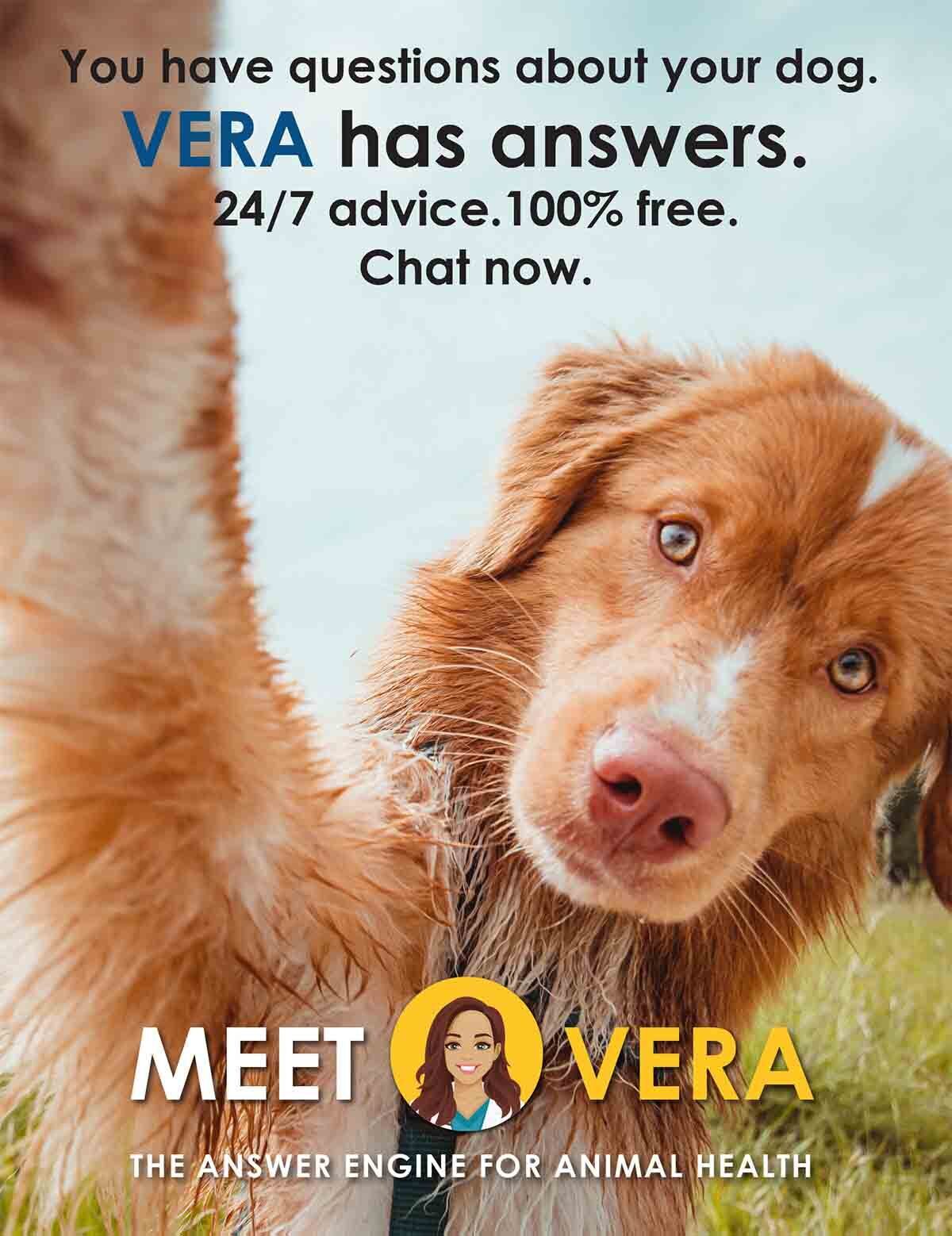Seeing their dog vomit is one of the most common reasons for pet parents to worry and seek veterinary care and advice. The act of vomiting is a reflex, and can be a symptom of a variety of medical issues. Vomiting can indicate a mild issue that may resolve all by itself, or it can be a symptom of a serious health problem. The causes of vomiting in dogs are so varied that the management and treatments need to be just as diverse!
While one single isolated incident of vomiting may be no big deal, the worry sets in when a dog owner notices their pup vomiting repeatedly. When you see these signs, consider conducting a physical exam at home, possibly detecting other physical abnormalities like dehydration, pale gums, and a rapid heart rate — all indications that your sick dog might need veterinary assistance.
Seeing your best buddy struggle in this way has pet owners wondering what they can do to help their poor vomiting dog feel better. Dog owners commonly ask, “Can I give Pepto Bismol and Tums? Do I take the food away? How long do I wait to seek veterinary care?” Since the cause of your dog’s vomiting remains unknown at the outset, veterinarians do not recommend giving any human over-the-counter medications, as these can further complicate or mask the underlying causes of the nausea and vomiting. There are some approaches at home that you can try, but ONLY if your dog seems to be otherwise stable and generally acting like his normal self.
AskVet Tip: Any vomiting dog that is also acting lethargic, not eating or drinking, or having diarrhea (with or without blood), is in need of urgent care. In addition, if pet parents have knowledge of their dog’s exposure to a potentially toxic substance, have witnessed or is suspecting that their pup may have eaten an object or toy that could cause a blockage in their dog’s stomach or intestines, or if a vomiting dog is on medication or has a chronic medical condition, please seek veterinary care immediately and contact AskVet or your family veterinarian urgently for advice.
What Can You Do At Home?
Dogs that have vomited a few times but are otherwise acting pretty normal, still have energy, and are interested in food and water may respond and benefit from some stomach-calming practices starting at home. Some dogs suffering from a mild and transient upset tummy may respond favorably and even recover over a short period of time! Always closely monitor them during this period and if symptoms do not improve, or even get worse, then to the vet you go!
AskVet Tip: Any young puppy that is vomiting has the potential to develop hypoglycemia (low blood sugar) or become dehydrated very quickly if their tiny bodies are deprived of the calories and fluids that are so important at this young age. It is recommended to seek veterinary care urgently for any small young puppy that is vomiting and not able to eat and drink so they can receive immediate treatment and support.
Bilious Vomiting Syndrome
Sometimes puppies and senior dogs will experience some vomiting due to their stomach being empty for a prolonged period of time during the hours in between meals. This long period with no food allows stomach acid to build up and make your dog nauseous! If your dog suffers from this condition, you may see vomiting first thing in the morning before breakfast, or sometimes in the late-afternoon, hours after the last meal. Dogs with bilious vomiting typically do not have any other symptoms of illness, have a good appetite, and are otherwise feeling fine. Since the stomach acids and bile are irritating their empty stomachs causing this vomiting, sometimes it helps to give them smaller meals more frequently; instead of 2 feedings a day, try to divide their food into 4 feedings and see if that helps!
Resting the Stomach and Intestines
Dogs that are vomiting may be experiencing stomach and intestinal irritation, blockages, or other imbalances inside their bodies. If the issue is simply an upset stomach, continued feeding tends to perpetuate nausea and stomach irritation. Sometimes, a short period of time without food can help nausea subside and the stomach to calm down. Waiting several hours to reintroduce any food after the last vomiting episode may improve the situation. (Note: this may not be advisable for young puppies as mentioned above!)
The same principle can apply to water as well – while it is not recommended to withhold water completely, your nauseous dog may be inclined to rapidly gulp down bowls full of water and then return it all to the floor shortly after. Allowing your dog to drink small, controlled amounts of water and refilling the bowl periodically can help their body absorb the water more effectively. For more specific recommendations on how much water to allow your vomiting dog to drink, contact your AskVet veterinarian.
When might it be a good idea to introduce food again? Once some time has passed since the last episode of vomiting, try to see how your pup tolerates a small amount of a “bland diet”. Small frequent meals of a diet that is easily processed by the stomach and intestines are sometimes just enough to get your dog’s digestion back on track.
AskVet Tip: For a bland and easily-digested diet, some veterinarians recommend boiling boneless skinless chicken breast/ground turkey/lean ground beef, absent of added salt or seasonings. With the cooked meat chopped into small pieces, combine with white rice in a 50/50 ratio. Start by feeding a very small amount initially – really just a taste – since we want to avoid expanding the stomach and risk causing vomiting again. The amount fed initially depends on the size of the dog – offer a small dog just ½-1 tablespoon, and a large dog may tolerate ¼ cup. If your dog handles this amount favorably and it does not end up back on the floor in 1-2 hours, repeat the small feeding. Continue to feed small frequent meals through the day, and if well tolerated slowly increase the amount of food given.
If your dog is tolerating the small frequent bland diet feedings and they’ve been vomit-free for at least 24 hours, then you can then consider mixing her regular kibble back into her diet. Try slowly weaning off the bland diet and back to the regular diet by gradually mixing in your pup’s regular food over a period of several days until she is back to her normal routine. By this time, hopefully the vomiting will be a thing of the past! (Although she may be reluctant to give up that chicken!)
Through this whole process, it is extremely important to continue to monitor your pup closely. Some dogs with a mild and transient issue will respond well and return to their regular life in a short period of time! Other dogs with more serious issues may not be so lucky and the vomiting will continue, possibly accompanied by concerning signs like drooling, diarrhea, not eating or drinking, dehydration, and low energy. Some dogs can be very stoic, like Boxers and Labradors, so don’t let them trick you by hiding their pain and acting like they are fine!
Also, always pay special attention to those cute pups with the smooshed faces (Pugs, Bulldogs, Frenchies etc) as they sometimes struggle more with complications from vomiting due to the anatomy of their throats and mouths. Smooshed-nose dogs are at risk for choking on their vomit, causing breathing issues and pneumonia. Unfortunately, any dog struggling with the above signs will need to see their veterinarian urgently for further testing and care.
Things To Avoid At Home
In the quest to help their sick dog, a dog owner will often wonder about these choices …
-Depriving dogs of water: Although monitored water consumption is recommended, it is never a good idea to remove all access to water
-Over-the-counter human medications: Pepto Bismol, Imodium, Miralax, Tums, Prilosec, Zantac, and Pepcid are all very tempting to try when dogs are having gastrointestinal issues, BUT until a veterinary exam and some testing is performed, these medications are NOT recommended unless authorized by your veterinarian
AskVet Tip: Dogs that have been vomiting likely will not poop due to very little nutrients moving through the GI tract! Not seeing a bowel movement for several days is not uncommon and does not necessarily mean the dog is constipated, so laxatives should be avoided. Straining to poop may indicate diarrhea or colitis, and occasionally constipation, but let your vet make that determination if you are concerned.
-Feeding raw meat: Handling and feeding raw meat is a public health risk and can cause serious gastrointestinal issues in dogs and humans, and may possibly make the stomach and intestinal issues worse.
-Gatorade or Pedialyte: These drinks are formulated for humans and can often complicate vomiting, electrolyte, and dehydration issues in dogs, so we recommend simply offering clean water. Seek veterinary care if you suspect your dog is dehydrated.
-Sporadic diet changes: Dogs are very sensitive to food changes, and often a diet change can cause stomach and intestinal upset, especially if done suddenly without a gentle transition over several days.
-Continuing to feed a bland diet indefinitely: A diet consisting of chicken and rice is not nutritionally balanced for long-term use. Transitioning your dog back to a commercially prepared balanced diet is recommended once they seem to have recovered from their gastrointestinal issue.
If the Vomiting Continues…
If small, frequent meals of a bland diet have failed to help your vomiting pup, or she has developed more serious signs like low energy and lethargy, diarrhea, or avoiding food and water, it is time to seek veterinary care. What might the vet do to get to the bottom of your dog’s issue and help them return to their happy go lucky self?
Veterinary Care for Vomiting
Exam and Diagnostic Testing
Your veterinarian will examine your dog for dehydration, signs of abdominal pain, fever, and other classic physical signs of disease. They will likely recommend a blood and urine test to check on how those internal organs are functioning, evaluate for electrolyte imbalances, and check the levels of red and white blood cells. Vomiting can be a symptom of a wide range of issues taking place in the body, so an x-ray of all of those internal organs is helpful too, especially if a foreign body (non-food object) obstruction may be suspected in the stomach or intestines. Ultrasound is another tool that helps us evaluate each organ individually for signs of irregularity.
Fluid Therapy
Once initial screening tests are underway, your veterinarian will likely recommend giving fluids to replace those that have been lost through vomiting, in order to help support the vital organs. Some dogs that are not severely dehydrated and are well enough to be sent home may just need a small pouch of fluids administered under their skin (subcutaneous fluids), which are slowly absorbed over the following hours. Other dogs that are severely dehydrated or need additional observation will be hospitalized and receive intravenous (IV) fluids to normalize their fluid and electrolyte balance.
Medications
Treatment with medications largely depends on test results, diagnosis, and condition of the patient. Many vomiting patients will receive an anti-nausea medication like Cerenia or Ondansetron. Since these pups may be experiencing a good bit of abdominal pain, they may also receive some pain medication too, like Buprenorphine. Unless surgery is to be performed, introducing a specific prescription food may be recommended too. On top of these treatments, your vet may also reach for a variety of other medications that can be beneficial for gastrointestinal issues in helping to reduce gastric acid, enhance intestinal movement, or treat infections. All these treatments are carefully selected based on your dog’s needs.
Surgery or Further Specialized Testing
Sometimes surgery may be indicated for some vomiting dogs. Surgery is useful to remove objects that are obstructing or harming the stomach and intestines, untwist a bloated stomach, biopsy the stomach and intestinal wall, visually inspect and take biopsy samples of internal organs, remove a malfunctioning gallbladder or infected uterus, excise or biopsy a tumor, remove an enlarged spleen … the list goes on!
Specialized testing is also needed in some cases in order to diagnose specific diseases. Tests to rule out Addison’s disease, evaluate kidney and liver function, check thyroid hormone levels, and rule out fecal parasites and bacterial infections all provide valuable information- even if the result is negative or normal! Some issues call for advanced imaging like CT scan or MRI to characterize complicated conditions as well. Each of these tests will yield helpful results and further narrow down a diagnosis.
Hoping For The Best!
While some cases of mild vomiting will resolve on their own with the above recommendations, always remain vigilant while your pup is not feeling well! Our veterinarians at AskVet are an excellent resource for triage and assistance with interpreting your pup’s condition and symptoms if you are not quite sure if he is at the point of needing help. If you are worried, consulting with a vet is always appropriate, and early intervention makes faster recovery too!
Our AskVet team is available to discuss all of your pet’s needs 24 hours a day, 7 days a week. Whether you have an immediate need or are looking to improve your pet’s overall wellbeing, just sign into your account and one of our friendly and knowledgeable veterinary experts will attend to your needs, no appointment required!






